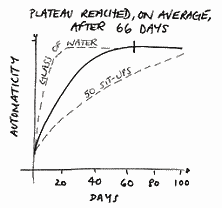
Happy New Year! I hope you had fun partying last night!
Today is the day to think about what you’re going to prioritise this year. Do you want to spend more time with your family? Is this going to be the year that you’re going to kick some career goals? Or is getting some balance back into your health and lifestyle the priority for you this year?
If you’re like many other Australians, improving your diet will be high on your list. Research shows that two thirds of Australians usually pledge to eat better as part of their New Year’s Resolutions. Unfortunately, most people tend to stick to their resolutions for only a few weeks though.
This year, I’d like to encourage you to focus on achieving sustainable changes. You want that too, don’t you?
Dr Phillippa Lally is a researcher at UCL in London who has a special interest in how habits are fomed. So, let’s examine her research for some guidance….
Happy New Year! I hope you had fun partying last night!
Today is the day to think about what you’re going to prioritise this year. Do you want to spend more time with your family? Is this going to be the year that you’re going to kick some career goals? Or is getting some balance back into your health and lifestyle the priority for you this year?
If you’re like many other Australians, improving your diet will be high on your list. Research shows that two thirds of Australians usually pledge to eat better as part of their New Year’s Resolutions. Unfortunately, most people tend to stick to their resolutions for only a few weeks though.
This year, I’d like to encourage you to focus on achieving sustainable changes. You want that too, don’t you?
Dr Phillippa Lally is a researcher at UCL in London who has a special interest in how habits are fomed. So, let’s examine her research for some guidance….
How long does it take to form a habit?
A ‘habit’ is something that you ‘just do’ without thinking about. Maybe brushing your teeth every morning after breakfast is a habit for you? Or opening the pantry door as soon as you walk into the house? In a study of 96 people, Dr Lally and her colleagues found that the average person took 66 days (2 months) for an action to become habitual. However, the time that it took for the action to become automatic ranged significantly from 18 to 264 days.
What does this mean for you? Once you’ve decided on your resolution, put some strategies in place to keep you accountable for the next 2 months. Do you need to make a pact with a friend to keep each other accountable? Could you put some reminders in your diary for the next 2 months? Do you need to pre-book an appointment with a dietitian for 2 months time?
Secrets to forming a habit
Dr Lally also investigated the secrets to forming a habit. After reading her research I would summarise her tips to date as:
1. Regularity – Dr Lally and her colleagues found that the more often that you undertake an action, the more likely that it will form a habit. So, if your goal is to increase your exercise, you are better off aiming to exercise for 10 minutes every day, than to exercise for an hour once per week.
2. Consistancy – Undertaking an action at the same time, in the same environment helps to form a habit. An example of this is that if your goal was to stop skipping breakfast, you would be more likely to form a habit of eating breakfast if you ate breakfast at the same time each day. Your routine might be to eat breakfast as soon as you’ve arrived at work each day, or to eat breakfast as soon as you’re dressed. Decide what your habit ‘trigger’ will be, then do it each day consistantly.
3. Simplicity – If a habit is something that happens automatically, the less complex that the action is and the less decisions that you need to make, the more likely it will become automatic. So, if your goal is to start packing your lunch each day, instead of trying to come up with some something different and creative, start with the same meal every day until the action of packing your lunch becomes a habit, then you can start varying what you prepare.
Don’t give up
There’s one other interesting fact that Dr Lally’s research found: if you miss a day, the sooner that you get back into your routine, the more likely that it will become a habit. We all have days where we ‘fall off the horse’. A birthday, holiday, illness or other gets in the way of what we’re trying to achieve. But, don’t give up. Dr Lally’s research found that missing a day occassionally did not decrease someone’s liklihood of developing a habit. So, don’t look at a missed day as failing, but just as part of life.
To do: Choose one specific habit that you want to make. Decide when, where and how often to undertake it. Then get started! You might like to share with us what your goal is to help keep you accountable….
